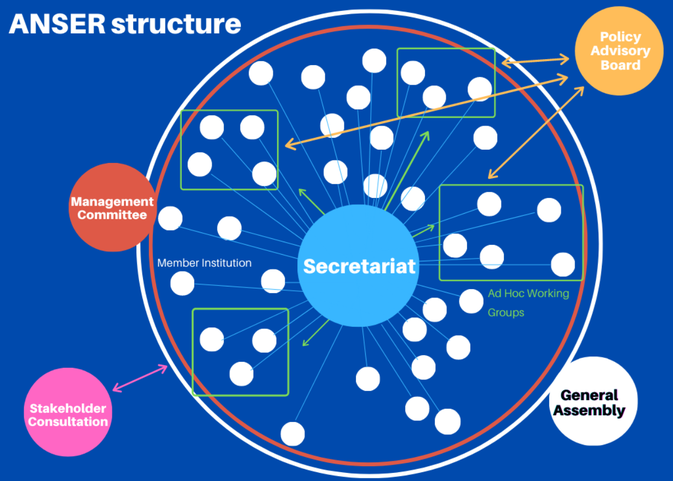About
History of the Network
In September 2015, 193 governments formally approved a set of 17 Sustainable Development Goals (SDG). In light of this, governments across the world were required to develop and implement new policies in order to achieve the targets set for these goals. Sexual and Reproductive Health and Rights (SRHR) lies at the immediate intersect of SDG3 (ensure healthy lives), SDG5 (achieve gender equality) and SDG10 (reduce inequalities), and has a direct link to many other goals. As a consequence, SRHR has a central position in these new policies.
The development of these new policies necessitates an evidence base to ensure their adequacy and effectiveness. Also, the success of their implementation is closely linked to reliable follow-up and monitoring by professionals with the required training and expertise. Finally, regular exchange of knowledge and sharing of experiences between different types of stakeholders and different countries can contribute to improving existing approaches and policies.
In light of the above, Ghent University established an Academic Network for Sexual and Reproductive Health and Rights Policy in December 2016. Back then the network had 16 members.
Mission, vision, focus and approach:
Mission:
ANSER is an International Thematic Network (ITN) that fosters interaction and knowledge sharing between academics and policymakers. Its members engage in joint research projects, weigh in on current policy debates and host innovative training programs. As a global resource for sexual and reproductive health and rights (SRHR) policy research, education and service delivery, ANSER helps to build an evidence-base for SRHR policies for everyone, everywhere.
Vision:
ANSER aims for a world where researchers, policy makers and practitioners work together and use their full array of knowledge and skills jointly to move effectively from SRHR evidence to policy plans to practice.
Thematic focus:
ANSER takes on a comprehensive approach to SRHR policies, including topics such as maternal health, contraception and family planning, safe abortion, SRHR of vulnerable groups, HIV and STI’s, sexual health and wellbeing, gender rights & gender based violence and SRHR monitoring & evaluation.
Approach:
ANSER helps building evidence based policies that support sexual and reproductive rights for everyone, everywhere through:
- Education: Improve master students’ knowledge on translating SRHR evidence into policy
- Research: Improve researchers’ knowledge on translating evidence into policy and increase SRHR research outputs that are directly relevant to society.
- Service to society: Improve policy makers’ and professionals’ knowledge of SRHR related evidence and increase the use of it by policy makers when developing policies.
Structure
ANSER Secretariat
ICRH (Ghent University) acts as the central coordinator to support members in setting up collaborations, steer the direction of the network and implement and coordinate the activities and planning. The secretariat is composed of:
- ANSER Director: Prof. Olivier Degomme
- ANSER coordinator: Emilie Peeters
General Assembly
All ANSER member institutions come together in an annual meeting that approves financial reports, observes general outputs of the network and identifies and reports on priority activities to keep on track with the planned outcomes. All individuals from an ANSER member institution are welcome to attend the General Assembly meeting.
Management Committee
Five promoters of full members, one promoter of an associated member, the network Director and the network Coordinator ensure direction of the network, overview activities and help to explore opportunities to find financial support. The members of the Management Committee are appointed by the General Assembly. The ANSER Management Committee is composed of:
- Prof. Elin Larsson (Karolinska Institutet, Sweden)
- Simukai Shamu (Foundation for Professional Development, South Africa)
- Prof. Sonia Dias (Universidade NOVA de Lisboa, Portugal)
- Prof. Tammary Esho (University of Nairobi, Kenya)
- Dr. Griffins Manguro (ICRH Kenya)
- James Munyao Kingoo (PhD representative, The Technical University of Kenya)
- Jia Yi Hee (PhD representative, Tsinghua University, China)
- Prof. Olivier Degomme (ICRH, Ghent University, Belgium)
- Emilie Peeters (ICRH, Ghent University, Belgium)
Members
ANSER consist of two types of members:
- Full members: academic institutions with an interest in SRHR policies
- Associated members: non-profit organisations involved in SRHR policy work with an interest in research
A full list of the members can be found here.
Ad Hoc Working Groups
ANSER member institutions come together to work on specific activities in smaller groups based on their interest. The Ad Hoc Working Groups are set up around activities decided upon by the General Assembly.
Policy Advisory Board
External policy makers or people with experience and expertise in policy development advise ANSER Ad Hoc Working Groups on how to make research more relevant for policy makers and how to increase policy involvement with the research data. The Board comes together on an ad hoc basis, when it's requested by an Ad Hoc Working Group. The members of the Advisory Board are selected by the Management Team and approved by the General Assembly.
Stakeholder Meetings
ANSER organises on an annual basis a meeting between its members and a wide range of SRHR stakeholders. The aim is twofold: to inform the non-academic stakeholders about recent evidence generated by ANSER and to seek feedback by the stakeholders on SRHR evidence needs in society to guide the ANSER work.
